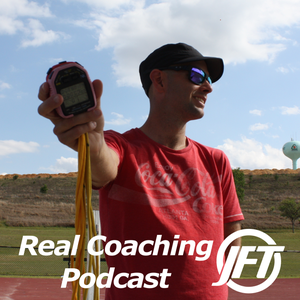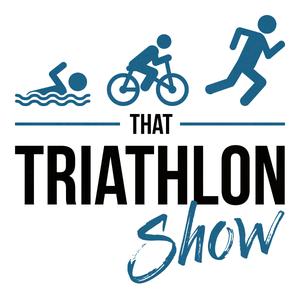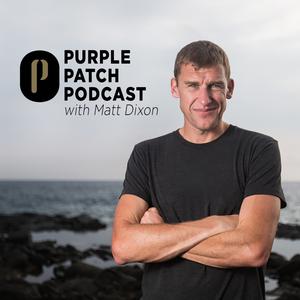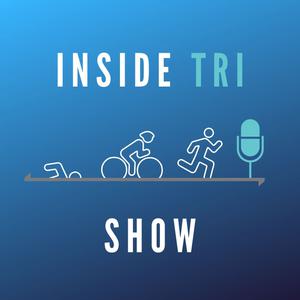
Real Coaching with Joel Filliol
Joel Filliol
Real Coaching with Joel Filliol
- 1 hour 28 minutes22: Championship Coaching
In this episode of the Real Coaching podcast Joel discusses preparing to coach athletes in championships with Swedish coach Joachim Willén, coach of rising star Vasco Villaça of Portugal. "The more you look, the more you see." Topics discussed include what's different about championships and the Olympic Games, how coaches can get the best out of their athletes. Preparation, the physical and mental approach, what to say and what not to say. Value based coaching, creating stability for yourself as a coach and for your athletes. How to develop as a coach and be ready for big opportunities at the right moments.
Notes from Episode 22:1-1 Consulting with Joel for coaches or athletes
14 December 2020, 1:13 pm - 1 hour 9 seconds21: Triathlon Swimming Revisited
In this episode of the Real Coaching podcast Joel revisits the topic of effective triathlon swim training, on the basis of the original popular “Top 20 Rules for Faster Triathlon Swimming’ article. Joel coverers why conditioning trumps drills, the role of frequency and volume in swim training, how to use swim ‘toys’ such as band, pull buoy and paddles, and different types of paddles. Joel also covers program design and set design and why triathlon swimming is different than pool swim training.
Show Notes
1-1 Consulting with Joel for coaches or athletes
Real Coaching Podcast 5: Swim Myth Busting
7 December 2020, 1:01 pm - 47 minutes 44 seconds20: Barrie Shepley
Canadian triathlon legend Barrie Shepley joins Joel on Episode 2 of season 3 of the Real Coaching Podcast. Barrie and Joel talk about Joel's progression from athlete to coach, and lessons learned along the way. From Joel's start racing in the Kids of Steel series in Ontario Canada, to the move to Victoria British Columbia to start 'real coaching', the Beijing Olympics, and how to work with top athletes, coaching 'superstars'. Why Joel left Canada, the move from British Triathlon before London 2012 and starting the JFTcrew squad, and where the sport headed in the future.
The episode starts with a discussion on the coaching workflow, planning process with the view on the season plan. Common mistakes in coaching are discussed and short term vs long term coaching issues.
Links:
Joel's ebooks and webinars: ebook 3-pack Building the Elite Triathlete, Characteristics of the High Level athlete and How Champions Train
Characteristics of Effective Coaching webinar + ebook
Barrie Shepley LinkedIn Twitter Personal Best Barrie's online clinic with Joel's interview and many others
20 November 2020, 11:41 am - 1 hour 1 minute19: Anti-Process 2020
The Real Coaching Podcast is back for Season 3. Joel reflects on the 2020 season, where finding process in uncertainty was necessary for success, and answers questions on managing training within the covid19 context, coaching remotely, planning changes over the short and long term. Joel talks about his background in coaching, advice for ITU focused coaching. Also discussed are tips for athletes who suffering from running injuries, differences between volume and intensity for men and women, metrics for recovery, managing different plans for athletes, choose camp locations, determining the pace of run sessions, choosing the level of races for your athletes and finding and sustaining success and how talent factors in ITU racing.
Joel's eBooks and video resources: joelfilliol.com/shop
13 November 2020, 2:15 pm - 1 hour 2 minutes18: Arild Tveiten Norway Head Coach
Arild Tveiten the Triathlon Norway Head Coach sits down with Joel to discuss all things triathlon and high performance, from the rise of Norway as a triathlon power, to testing, organization of sessions, altitude, season planning, the 70.3 world best time, Tokyo 2020 and more. Show Notes: http://joelfilliol.com/podcast/2019/1/21/arild-tveiten-norway-head-coach
22 January 2019, 10:04 am - 46 minutes 15 seconds17: Questions and Answers
The Real Coaching Podcast returns, with Joel answering questions on training, racing, performance, squad dynamics and more following the Gold Coast ITU Grand Final where the JFTcrew men went 1-2-3 in the WTS podium, and Katie Zaferes took silver for the women.
Show notes: https://joelfilliol.com/podcast/2019/1/17/17-questions-and-answers
17 January 2019, 3:03 pm - 1 hour 29 minutes16: Sprinting towards Tokyo
The 2020 Tokyo Olympic Games may change to a sprint format combined with a mixed team relay: we discuss the background, history, racing and training implications. Lab testing season for triathletes is here, and we break down this trend, and why this doesn't move athletes performance forward. The marginalization of coaches, over-promising and under-delivering of sport science. Decision making and why this is the key to real coaching effectiveness. We address questions on high load training camps, what to do about illness, elite vs age group training, HIIT blocks, marginal gains, and nutrition questions from fasted training, supplements, protein and recovery drinks.
Show Notes: http://joelfilliol.com/podcast/2016/11/15/sprinting-towards-tokyo
15 November 2016, 9:26 pm - 1 hour 37 minutes15: Training Needs Hierarchy
Training needs in terms of importance are discussed, from total frequency and volume of training, to high intensity, to training distribution, to periodisation and tapering. We discuss Vicky Holland's interview, comparing and contrasting her training with Darren Smith and the Leeds Triathlon centre, the polarized approach, historical trends of planning and intensity distribution. Follow up questions are addressed including running economy, drills, and tips, run analytics, maintaining endurance fitness between events, structuring a season for both early season and late season races, and whether training gear can affect injuries. The Island House and final ITU World Cups are discussed along with development pathways.
7 November 2016, 6:50 pm - 1 hour 27 minutes14: Kona Breakdown
Kona analysis including Frodeno vs Keinle, Ryf vs the clock, front pack dynamics, drafting, penalties, which pros should race Kona, and why we need smaller fields for better racing. We breakdown Triathlon New Zealand, and the resignation of the HPD, the history of success in New Zealand and the challenge of re-building the culture there. Back on the ever green doping topic, we discuss the ongoing TUE saga, and motor doping. Finally planning training for the future and reviewing the past, what went well, what didn't and how we'll take these points forward in future episodes.
16 October 2016, 12:00 am - 1 hour 21 minutes13: We love Kona / Kona Sucks
The importance of Kona for triathlon, and the professional circuit, prize money, progression of the sport. Salinas ITU World cup, and development of runners into triathletes. High Performance funding and organisation, how "athlete-centered, coach driven" has become jargon and not reality. Key run sessions, organising run training, minimal effective dose, healthy training load and what causes injuries and how to avoid falling into inconsistency.
1 October 2016, 12:00 am - 1 hour 15 minutes12: Chop Wood, Carry Water: End of ITU WTS Season & 70.3 World Champs
The ITU WTS end of season races are reviewed including WTS Edmonton, the Grand Final in Cozumel, including the conditions, the tactics, the Brownlee drama and how the World Champions were decided. The 70.3 World Champs including the dominance by Holly Lawrence, the controversy around motor-pacing, entourages and transparency, are discussed along with the Fancy Bears WADA hack and TUE abuse and whether TUEs should be public.
21 September 2016, 12:00 am - More Episodes? Get the App
Your feedback is valuable to us. Should you encounter any bugs, glitches, lack of functionality or other problems, please email us on [email protected] or join Moon.FM Telegram Group where you can talk directly to the dev team who are happy to answer any queries.
 That Triathlon Show
That Triathlon Show
 Purple Patch Podcast
Purple Patch Podcast
 Inside Tri Show
Inside Tri Show